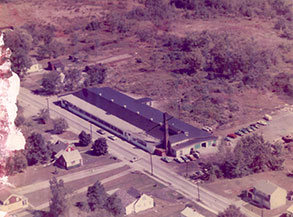
A local developer has revised his plans and has agreed to add retail space to a $2 million luxury apartment complex proposed for North Hudson Avenue where the old American Linen plant once stood.
The change followed a public hearing in April where several residents voiced a greater need for commercial/retail business in the village versus strictly housing at the lot at 950 Hudson Ave.
New plans presented to the village Board of Trustees on May 19 call for constructing the same 40 apartments but accompanying that would be 6,260 square feet of retail space, and additional parking space behind the commercial area. The apartments would be three stories, instead of two stories, to make space for the retail building.
“I think this is what you asked for so we’re hoping to get approval so we can move forward and make this project come to life in the village,” said Joseph Bianchine, of ABD Engineering.
Eight or nine years ago, the same developer proposed a mix of apartments and retail units for the American Linen property, including a strip mall and a bank. But after the developer got all of its approvals the country went into a recession and the project was abandoned.
Many people at the April hearing claimed the developer didn’t try hard enough to find retailers for the mall at the time, or said they should revisit retail today because the economy has changed. Some of the retail interests they mentioned included a bakery, laundromat, drug store and diner.
“Last meeting’s reoccurring theme was retail space,” said Trustee Judith Wood-Shaw. “We went over every concern from the public hearing word for word, and everything was answered positively and thoroughly (by the developer). We all worked together to come up with a solution and to make this happen for us and for them.”
Camelot Associates first pitched an idea to the board at a meeting last July to erect 40 one- and two-bedroom apartments on the long-vacant factory land, and lease them starting at $900 a month. The modern living units, with vinyl and brick exteriors, would be targeted to retired people, professionals and empty nesters.
The developers are seeking a special use permit from the village and approval of its application for local land development to move forward. It must also clear an environmental review as part of the application.
As part of the compromise to add retail space, if the developer cannot lease the commercial space within one year, the commercial space would be abandoned and converted to four more apartments, making the total complex 44 living units. Some board members had asked that time period be extended from 18 months to two years but the developers declined, saying it would create a “financial hardship.”
Trustee John Murphy said while he’d like to see a little more “design” architecturally to match the historic character of the village, he likes the mixed retail/apartment plan “better than the previous one.”
“There are significant changes here,” Murphy said. “It’s clear the feedback we generated and that the public generated has been incorporated to a good extent.”
Trustees voted unanimously to approve the revised preliminary site plan for the project and modify the special use permit submitted by Camelot and ABD Engineering to be presented at the June 16 meeting.
In other action May 19:
- Trustees authorized Mayor Nelson to execute a professional services contract with Administrative Solutions to provide grantwriting services for the village. The company specializes in procuring grants for community and economic development, and infrastructure improvements for municipalities. Earlier this year the village had sought Requests For Proposals (RFPs) from grantwriting agencies and received three responses. Trustees chose Administrative Solutions as the best qualified to meet the village’s needs.
- Trustees discussed changes to Major Dickinson Park after a resident sent a letter to the mayor with concerns it would be permanently shut down. The village’s insurance company advised the DPW to remove some of the playground equipment there because it was aging and had become unsafe for children. Mayor Nelson said the park, known to many as the “sand lot,” would still be available for residents’ use but perhaps for walking trails, as a dog walking park and/or picnic area, but no longer as a playground. The village purchased new playground equipment last fall for the old tennis courts behind the American Legion Post, and created a new park there.
- Trustee Murphy said the village is in the process of surveying village streets and ranking them in order of greatest need for improvement and repair in terms of potholes, cracks, etc. The priority list will be used to determine how the village will spend the state funding it receives each year under the Consolidated Local Street and Highway Improvement Program (CHIPS). “We’ll start the priority list and make it public, so if people want to come in and campaign for their streets, they will be welcome to do that,” Mayor Nelson said. “We want to be transparent and work together with them on this.”
- Trustee Frank Tatum said he plans on working with the NYS Department of Transportation to improve crosswalk street markings and install “yield to pedestrians in the crosswalk” signs at three locations along Hudson Avenue … near the Blockhouse, library and post office. A study showed 5,800 cars travel that road a day, and Tatum said he’s personally witnessed people trying to cross the busy road, but cars do not stop for them. “It seems like an inexpensive way for us to get some compliance to the state crosswalk law,” he said.
- Trustees voted to add Dr. Martin Luther King, Jr. Day in January to the list of holidays for village employees.
